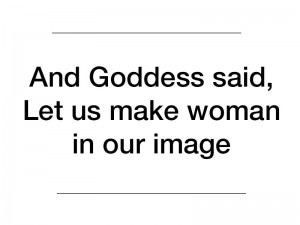“And Goddess said, Let us make woman in our image, after our likeness: and let them have dominion over the fish of the sea, and over the fowl of the air, and over the cattle, and over all the earth, and over every creeping thing that creepeth upon the earth. So Goddess created woman in her own image, in the image of Goddess created she her; female and male created she them.” –Genesis 1:26-27
 The (somewhat) familiar words that appear above are taken from the digital version of the “Queen Jamie” Bible found through a curious little website called “regender.com.” Though I’m not proposing that we henceforth adopt this translation at Houghton, I include this website as one example of many tools that are used to demonstrate the real and affective power of language. The issue of considerate, respectful usage extends to every aspect of meaningful interaction with others. Words mean things and exclusive, hurtful words, whether used deliberately or not, can communicate damaging messages. Words matter. As far as I’m concerned, the validity of this short statement is not up for debate. I’d add that, whether you’re incensed or intrigued by the passage quoted at the start, you’ve proved my analysis correct.
The (somewhat) familiar words that appear above are taken from the digital version of the “Queen Jamie” Bible found through a curious little website called “regender.com.” Though I’m not proposing that we henceforth adopt this translation at Houghton, I include this website as one example of many tools that are used to demonstrate the real and affective power of language. The issue of considerate, respectful usage extends to every aspect of meaningful interaction with others. Words mean things and exclusive, hurtful words, whether used deliberately or not, can communicate damaging messages. Words matter. As far as I’m concerned, the validity of this short statement is not up for debate. I’d add that, whether you’re incensed or intrigued by the passage quoted at the start, you’ve proved my analysis correct.
Acknowledging that words matter, the question becomes, how do we handle language? Issues of “language justice” are wide and varied. One may note that there are certain discriminatory names that we’ve agreed not to call one another. The fact that I need not identify them is proof enough of our more-or-less consensual agreement. I say more-or-less because, of course, battles are still being fought, and though I don’t want to callously ignore sensitive issues, I do want to zero in on the one area of language usage of which I believe Houghton as an institution is negligent, namely, gender-inclusive language.
Despite the way I started this piece, I don’t want to address gender-inclusive language only with respect to the Bible. Certainly, I think the way we talk about gender, theology, and Christianity is important to consider, and if you are interested in this intersection, get ahold of Dr. Lacelle-Peterson’s book, “Liberating Tradition.” Leaving that conversation to experts, I will use the remainder of my space to talk about the more broad presence (or, rather, absence) of gender-inclusive language standards at Houghton.
I recently interviewed several faculty members as part of a project on inclusive language. None of them could point to any college-wide policy that actively addresses gender-inclusivity with respect to college communications, student usage and awareness, or academic writing guidelines. Though several years ago there was a “diversity committee” set up to draft a school-wide policy on the topic, the resulting document was never institutionalized. Though some individuals voluntarily include sections of this proposed policy in their syllabi, there are no stated, compulsory expectations.
I was surprised by my lack of findings. I decided to research official policies at other institutions. Every school that I found in my search was connected with respect to approving, adopting, or maintaining this or that guideline for non-sexist communication, whether in academic writing, in marketing, or in student handbooks (for example, UNC replaced every instance of “freshman” with “first year student”). Lest you think that I’m unjustly pushing “secular standards” of higher education (whatever that means), I’ll go ahead and mention some examples closer to home. Apart from many seminary institutions, Calvin College, George Fox University, Goshen College, Westmont College, and Wheaton College all deliberately and publicly use their website to address the importance of gender inclusive and non-discriminatory language.
In identifying the above schools, I don’t mean to suggest that they have all the kinks figured out. People in higher education everywhere struggle with flawlessly maintaining gender-inclusive language; no one is perfect, and surely mistakes are made in myriad places and contexts. I’m also not insinuating that the Houghton community has done nothing to support gender-inclusive language. Many individuals consistently model consciousness usage, and I’m thankful that, as I mentioned, some professors have addressed gender-inclusive language on their own terms. I bring up other schools because doing so emphasizes the dramatic lack of institutional support at Houghton. Relying on instructor-initiated treatment unnecessarily politicizes what should be a non-issue, and the preeminence of gender-inclusive usage should supersede professorial preference. For deeply moral and political reasons, it’s simply a fact that no serious college has made it to this point in the 21st century without requiring gender-inclusive language.
Call it naiveté, but I’m optimistic that the majority of people at Houghton will agree with me. In the spirit of community dialogue recently championed by Dean Jordan in his “Christians and Same Sex Attraction” lecture, I welcome any disagreement in the form of conversation. However, if my hopes about this community prove true, then the institution need only stand behind its individuals. It’s time we make up our mind, make it policy, and make it public.
